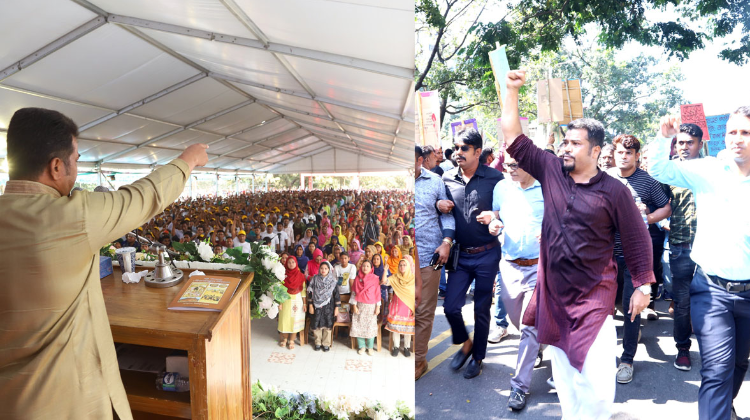Labour Rights & Employment Crisis in Bangladesh
Category :
The Outline of Real Islam

Author ::
Salzar Rahman Sabu
Jul 11, 2025
visibility
98 Read
As International Workers' Day approaches, the emphasis is on asserting labour rights such as workplace safety, fair wages, regulated working hours, and access to healthcare. However, a critical prerequisite to exercising these rights is the availability of employment opportunities, without which such rights become meaningless.
Mass Unemployment and Job Insecurity
The country faces a severe unemployment crisis, with over 26 million people currently without jobs. This not only affects those already unemployed but also instills fear among the employed, who live under constant anxiety about potential job loss.
Global Economic Crises and Their Impact
The COVID-19 pandemic and the Russia-Ukraine war have deeply disrupted global labour markets. According to the International Labour Organization, around 400 million people worldwide have lost their jobs due to these crises. Bangladesh, like many developing nations, is particularly vulnerable, and its workers continue to suffer from job losses and economic uncertainty.
Post-Pandemic Employment Challenges
Many workers in Bangladesh have not been able to return to their previous jobs after the pandemic. The added strain from global inflation and international conflict is forcing families to make difficult choices, such as pulling children out of school to reduce household expenses.
Widening Wage Disparity
Income inequality is increasing sharply in Bangladesh. A SANEM study shows that 74% of the country’s income is held by just 1% of the population. Even as household expenditures rise—by 13% in the last six months—income levels have not increased accordingly, especially for families dependent on agriculture and low-paying jobs.
Economic Pressures and Rising Living Costs
The situation is further aggravated by global price hikes, currency devaluation, and market instability. These factors contribute to the worsening financial condition of low-income families, prompting research institutions to urge corrective action in product pricing, currency management, and market regulation.
Rising Household Debt and Struggling Workers
A recent BBS survey found that 30% of families are currently surviving on loans, with average debt levels having nearly doubled over six years. Inflation has made even basic necessities like food unaffordable for many, leaving workers unable to keep up with the cost of living due to stagnant wages.
Inflation Outpacing Wage Growth
Inflation reached a record high of 9.52% in September of the previous year, while wages rose by only 6.80% during the same period. This growing gap between wage increases and inflation highlights the financial imbalance workers face, as their expenses consistently exceed their income.
Structural Economic Inequality and Underutilized Workforce
Economists warn that although the overall economy is expanding, inequality remains pervasive. The country's economic potential is being undercut by an underutilized workforce, low worker skill levels, and an education system that fails to produce employable graduates, contributing to educated unemployment.
Need for Education Reform and Investment in Jobs
To address these interlinked issues, experts call for a complete overhaul of the education system and large-scale investments in job creation. Without targeted government action to enhance education quality and foster a favourable employment environment, the nation risks leaving a vast portion of its labour force idle and unproductive.
Images Related to this Post
Search
Popular Post
Recent Post
Tags
Hezbut_Tawheed
Southasia
Extremism
Bangladesh
India
Pakistan
Myanmar
Jihad
Islamophobia
Radicalism
Resistance
Conflict
War
Terrorism
Proxywar
Bjp
Hasina
Ghazwa
Kashmir
Rohingya
Arsa
Militancy
Ideology
Unity
Awareness
Injustice
Arms
Geopolitics
Zionism
Gaza
Hypocrisy
Taliban
Alqaeda
Afghanistan
Syria
Iraq
America
China
Russia
Media
Violence
Oppression
Nationalism
Muslim
Islam
Justice
Youth
Leadership
Sovereignty
Hezbuttawheed
Mosque
Governance
Society
Administration
Education
Military
Economy
Women
Culture
Law
Quran
Hadith
Prayer
Madinah
Baytalmal
Amir
Discipline
Khutba
Transparency
Spirituality
Training
Morality
Ummah
Prophet
Sharia
Community
Peace
Development
Security
National
Khutbah
Sabr
Zakat
Sufism
Equality
Mosquesystem
Participation
Aqiqah
Accountability
Tradition
Modernity
Ummati Muhammad
Unity In Islam
Sunnah
Islamic History
Prophet Muhammad
Islamic Teachings
Islamic Unity
Muslim World
Deen Of Islam
Security Crisis
National Unity
Political Unrest
Military Vulnerabilities
Strength
Solidarity
Disunity
Muslim Nations
Global Peace
Women's Rights
Rufaidah Panni
Eid Congregation
Islamic Women Empowerment
Muslim Women
Social Justice
Equality In Islam
Momen
Kafir
Mushrik
Tawheed
Allah's Laws
Islamic Governance
Faith In Islam
Shirk
Belief In Allah
True Believers
Kalimah
Shariah
Islamic System
Justice And Peace
Political Parties
Multiparty Democracy
Political Factionalism
Islamic Political System
Democracy Vs Islam
Secularism
Political Ideologies
Islamic Law
Political Vision
Governance Without Parties
Political Stability
Islamic State
Shura System
Islamic Perspective
Women’s Reform Commission
Family Law
Inheritance Law
Sex Workers
Labor Recognition
Shariah Law
Gender Equality
Religious Opposition
Feminist Movement
Sex Work
Human Rights
Political Debat
Arab Society
Islamic Economic Justice
Military Transformation
Education In Islam
Judicial Independence
Accountability In Islam
Caliph Umar
Islamic Reform
Islam And Democracy
Societal Transformation
Governance Systems
Surah Yaseen
Islamic Guidance
Religious Work
Misguidance
Imam Role
Religious Commercialization
Truth And Falsehood
Religion And Society
Quranic Teachings
Ethical Leadership
Justice In Islam
Spiritual Struggle
Religious Scholars
Religious Corruption
Quranic Verses
Islamic Scholars
Prophet Muhammad (S.a.w)
Muslim Ummah
Military Nation Of Islam
Sahabah
Lost Legacy
Islamic Revival
Ummah Of Muhammad
Jehad
Qetal
Islam And Violence
Islamic Leadership
True Islam
State Vs Individual Struggle
Allah's Help
Islamic Reflection
Divine Support
Muslim World Crisis
Quran Teachings
Islamic Awakening
Qurbani
National Security
Bangladesh Politics
Eid Ul Adha
Islamic Sacrifice
Bangladesh Crisis
Global Conspiracy
Sacrifice
Labour Rights
Employment Crisis
Bangladesh Economy
Wage Gap
Inflation
Unemployment
Education Reform
Job Creation
Income Inequality
Post-Pandemic Economy
Eid-Ul-Azha 2025
Bangladesh Eid Congregation
Islamic Movement
Eid Prayer 2025
Muslim Unity
Women's Participation
Peace & Justice
Bangladesh Religious Events
Eid-Ul-Azha Message
Khilafah
Global Oppression
Islamic Festivals
Quranic Guidance
Spiritual Sacrifice
Ibrahim's Sacrifice
Eid Mubarak
Peace Through Tawheed
Women's Reform Debate
Bangladesh Women's Rights
Hezbut Tawheed Position
Islamic View On Women's Rights
Legal Reforms Bangladesh
Sex Workers Debate
Family Law Reform
Inheritance Rights
Sharia Law Bangladesh
Women's Equality
Western Influence
Religious Groups Debate
Gender Equality Islam
Islamic Social Solutions
Women's Dignity In Islam
Islamic Solutions
Beyond Politics
Labor Rights
Class Struggle
Economic Solutions
May Day Analysis
Economic Justice
Divine Accountability
Global Economic Crisis
Capitalism Vs Islam
Socialism Vs Islam
Religious Extremism
Bangladesh Violence
Savar Attack
Ishwardi Attack
Religious Fanaticism
Political Manipulation
Islamic Extremism
Extremist Violence
Government Response
Democratic Threats
Islamic Teachings Misuse
Radical Ideology
Communal Conflict
Radical Groups In Bangladesh
Terrorism In Bangladesh
Islamic Rights
Mosque Access
Eid Prayer
Islamic Social Justice
Muslim Women Empowerment
Prophet Muhammad Teachings
Women In Mosques
Women Rights In Islam
Gender Equality In Islam
Masjid An-Nabawi
Women's Role In Islam
Misconceptions About Women
Women Participation In Mosque
Eid Khutbah 2025
Islamic Sermon
Hossain Mohammad Selim
Bangladesh Eid
Qurbani Meaning
Women In Islam
Rufaydah Panni
Islamic Congregation
Female Participation In Eid
Chashirhat Eid
Palestine Solidarity
Eid Prayer Bangladesh
Women In Eid
Kushtia Rally
Imam Hossain Mohammad Salim
Gaza Crisis
Muslim Persecution
Bangladesh News
Peace Movement
Humanity
Divine Law
Social Reform
Religious Harmony
Truth
Call To Action
Palestine
Dajjal
Islamic Struggle
Mohammad Bayazid Khan Panni
Genocide
Oic
Protest
National Press Club
Rangpur Attack
Religious Reform
Karwan Bazar Protest
Religious Violence
Terrorist Attack
Law And Order Failure
Social Transformation
Emamht
Ht_In_Brief
Pabnaattack
Justiceforvictims
Humanchain
Politicalviolence
Legalreform
Endimpunity
Bangladeshjustice
Hezbuttawheedleaders
Demandjustice
Pabnapressconference
Policeinaction
Proposedgovernancesystem
Islamicstatesystem
Allahslaw
Economicreform
Educationreform
Capitalismcritique
Dhakaevent
Purposeofcreation
Humancreation
Khalifah
Allahsplan
Divineguidance
Adamsstory
Islamicteachings
Peaceandjustice
Sovereigntyofallah
Lailahaillallah
Islamiccreed
Aqidah
Islamicfaith
Iman
Deen
Peaceinislam
Purposeofislam
Beliefsystem
Faithandworship
Why
Escalate
Mohammad Bayazeed Khan Panni
Hossain Mohammad Salim
Religious
Extremist
Interfaith
Situation
Ultimatum
Threats
Extremist Attack
Attack
Movement
Barakat Hossain Osama
United Kingdom
Conservative Party
Donald Trump
Secular Leadership
Fanatical Populace
Fanatical
Populace
Religion
Extensive Damage
Catastrophic Flooding
High School
Urgent Help Needed
Devastated
Allah
Modus Operandi
Messenger
Believer
Messenger Of Allah
People
Human
Jame Mosque
Shahidi Jame Mosque
A Cornerstone
Cornerstone
A Just Society
The Establishment
Establishment
History
Messenger Muhammad
Simple And Straightforward
Who Made
The Simple
Complex
Way Of Life
Jannah
Way To Jannah
Civilization
Religious Figures
Survive
Politics
Worship
Establish
Goals And Objectives
System Of Life
Money
Tolerance
Madness
Mo'men
Today’s
Educated
Needs
Corruption
British
Government
Democracy
Communism
Socialism
Political
Secular Education
Responsible
The Reign
Hindu
Terrifying
Slavery
Jewish Conspiracy
The Protocols Of The Elders Of Zion
Politician
Give And Take
Education System
European
Population
Mentality
Slave
Preface
Children
The Quran
The Miracle
Creator
The Creator
Creation Of Man
The Creation Of Man
Premise
First Words
Aqida
The Programme
The Messenger
Mankind
Actual
Concept Of Islam
Crossroads
Mojeza
The Call
Panni
The Author
Qur'an
Process
The Process
A Person
Tabook
The Special Three
Special
The Tabook
The Ahzab
Ahzab
Khandak
The Uhud
Uhud
The Badr
Badr
Ebadat
Ma'bud
Vicegerent
Worshipper
Aqaed
The Reasons
Reasons
Reason
Adam
Eblis
Khalifa
Angels
Adam And Eve
Adam And Hawa









Leave a Comment